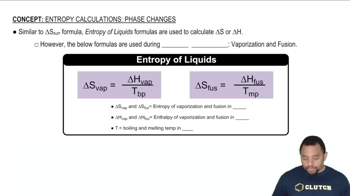Open Question
Consider the sublimation of iodine at 25.0 °C: I2(s) → I2(g). a. Find ΔG°rxn at 25.0 °C.




Consider the sublimation of iodine at 25.0 °C : I2(s) → I2(g) b. Find ΔG°rxn at 25.0 °C under the following nonstandard conditions: i. PI2 = 1.00 mmHg ii. PI2 = 0.100 mmHg
Consider the sublimation of iodine at 25.0 °C : I2(s) → I2(g) c. Explain why iodine spontaneously sublimes in open air at 25.0 °C
Consider the evaporation of methanol at 25.0 °C : CH3OH(l) → CH3OH(g) b. Find ΔGr at 25.0 °C under the following nonstandard conditions: i. PCH3OH = 150.0 mmHg ii. PCH3OH = 100.0 mmHg iii. PCH3OH = 10.0 mmHg
Consider the evaporation of methanol at 25.0 °C : CH3OH(l) → CH3OH(g) c. Explain why methanol spontaneously evaporates in open air at 25.0 °C